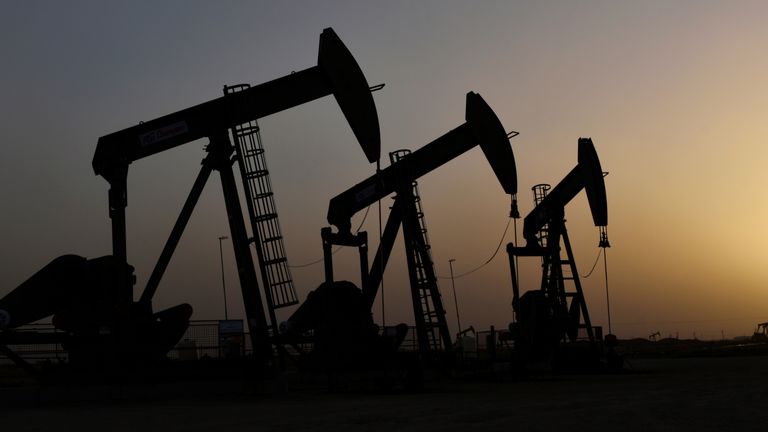Oil prices in the US have crashed below zero for the first time in history as demand for energy plummeted due to the coronavirus pandemic.
The historic fall was fuelled by traders not wanting to get stuck owning crude oil with nowhere to keep it.
The dramatic decline in demand due to the COVID-19 crisis means storage facilities are nearly full.
Tanks could hit their limits within three weeks, according to analysts.
Naeem Aslam, of Avatrade, said in a report: "The steep fall in the price is because of the lack of sufficient demand and lack of storage place given the fact that the production cut has failed to address the supply glut."
David Winans, of US Investment Grad Credit Research, said: "Today's price move feels like oil is passing a kidney
stone.
"A very painful move but it can't last for long, since producers are switching off wells as we speak."
He argued the demand shock from coronavirus was "overwhelming everything".
Mr Winans added: "Ultimately, the path for oil prices is going to follow the path of this virus.
"Until demand shows some sign of life, oil prices will likely remain on life support."
:: Listen to Divided States on Apple podcasts, Google Podcasts, Spotify, and Spreaker
The plunge into negative territory led to the bizarre situation where traders were being paid more than $40 to buy a barrel of oil.
Oil in the US is traded on a "future" contract and whoever owns it when it expires is obliged to take delivery of the barrel.
With the deadline for May contracts up on Tuesday, traders scrambled to offload their barrels, so they were not left to pick up oil which they do not have the ability to collect.
It meant they were willing to pay a lot of money to anyone willing to take the product off their hands.
Normally traders have no problem selling their contracts to a refinery, or other business that wants oil, before the deadline.
But international demand has dropped significantly in recent weeks, leading to the market being flooded by oil.
With many storage sites full and unable to take any more, final buyers are difficult to find.
However, the collapse is unlikely to lead directly to significant discounts for drivers at the pumps.
The price of Brent crude - the international price - is still around the $25 mark.
Sky's business presenter Ian King said the movement is about the financial markets as much as the oil market.
He added: "The May futures contract in (West Texas Intermediate crude) expires at 1430 eastern time Tuesday and, at that point, anyone still holding that contract at expiry will be obliged to take delivery of 1,000 barrels of crude.
"As storage in the US is running at full capacity, and no refineries want to take delivery of that crude either, the holders of those contracts are falling over themselves to sell them - even to the extent of paying people to take those contracts off their hands. Hence the negative price.
"It is important to note that the price of the June WTI contract is $21 a barrel, the July contract is $27 and the August contract is $29 - so this movement in the May contract, while extraordinary, does not mean oil is valueless.
"That's also why the share price of oil companies has not collapsed in sympathy - for example, Exxon Mobil, America's biggest oil company, is down by just 4% or so on the session.
"It is also worth noting that Brent Crude - the benchmark in other parts of the world - is still trading at around $25 or so because there is storage space elsewhere around the world and big oil importers like China, India and South Korea, are still happy to buy and stockpile Brent.
"That said, if the supply and demand imbalances in oil persist, they too will quickly run out of storage capacity if they end up being the buyer of last resort.
"And that imbalance between supply and demand is likely to persist, at least in the near term. The OPEC cartel and other producers, including Russia, are planning to cut production by nearly 10 million barrels per day in May.
"However, according to the International Energy Agency, demand has fallen by more than twice that amount due to the lockdowns around the world. That 'demand destruction', in the jargon, means that there will continue to be downward pressure on prices at least in the short term."
https://news.google.com/__i/rss/rd/articles/CBMiXWh0dHBzOi8vbmV3cy5za3kuY29tL3N0b3J5L3VzLW9pbC1wcmljZS1wbHVuZ2VzLWJlbG93LXplcm8tZm9yLWZpcnN0LXRpbWUtaW4taGlzdG9yeS0xMTk3NjE2NdIBYWh0dHBzOi8vbmV3cy5za3kuY29tL3N0b3J5L2FtcC91cy1vaWwtcHJpY2UtcGx1bmdlcy1iZWxvdy16ZXJvLWZvci1maXJzdC10aW1lLWluLWhpc3RvcnktMTE5NzYxNjU?oc=5
2020-04-20 19:32:22Z
CBMiXWh0dHBzOi8vbmV3cy5za3kuY29tL3N0b3J5L3VzLW9pbC1wcmljZS1wbHVuZ2VzLWJlbG93LXplcm8tZm9yLWZpcnN0LXRpbWUtaW4taGlzdG9yeS0xMTk3NjE2NdIBYWh0dHBzOi8vbmV3cy5za3kuY29tL3N0b3J5L2FtcC91cy1vaWwtcHJpY2UtcGx1bmdlcy1iZWxvdy16ZXJvLWZvci1maXJzdC10aW1lLWluLWhpc3RvcnktMTE5NzYxNjU


Tidak ada komentar:
Posting Komentar